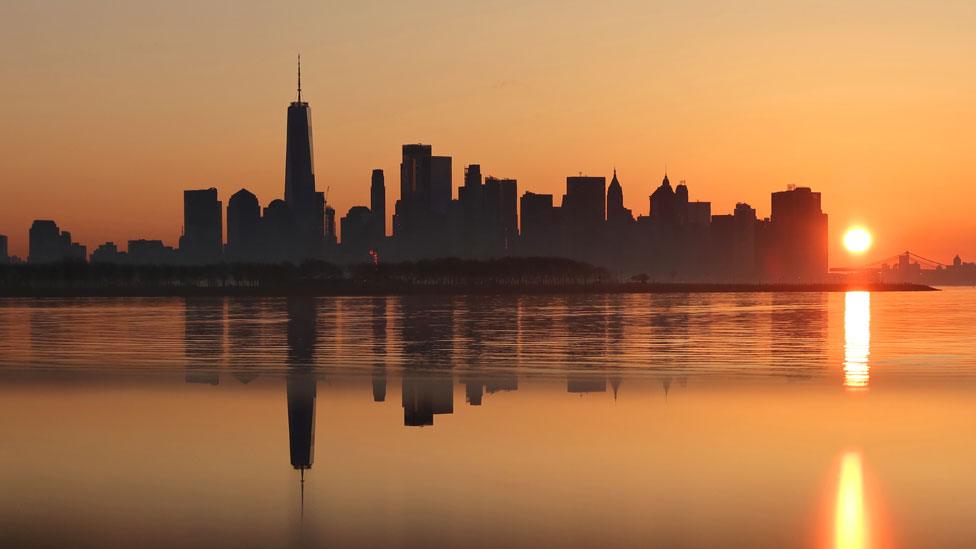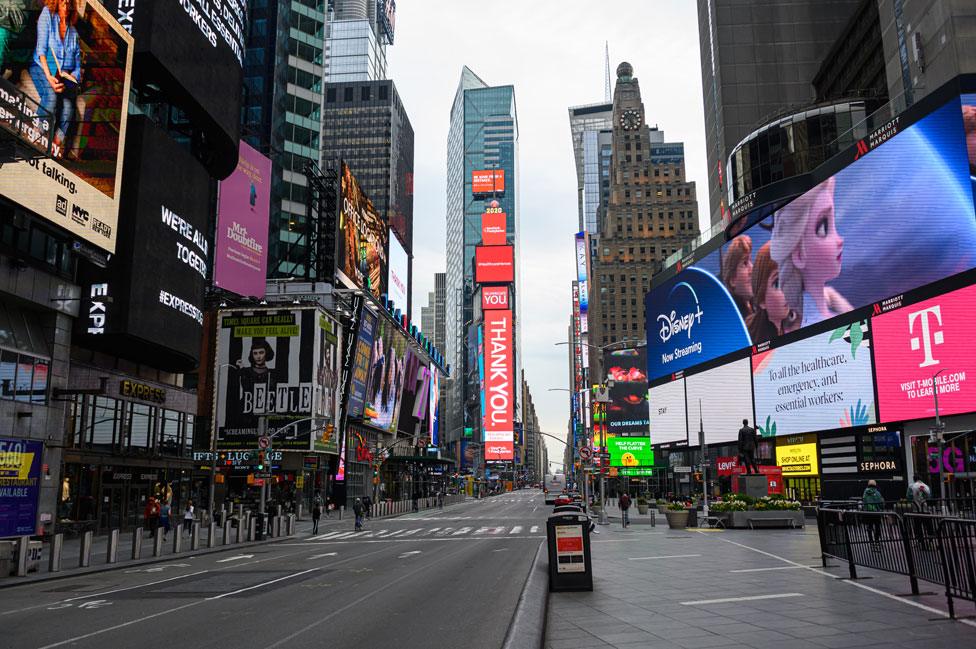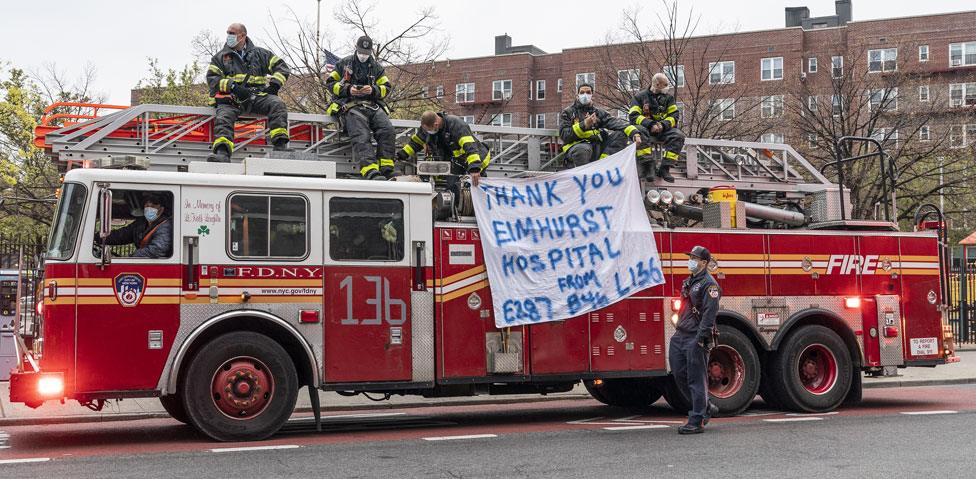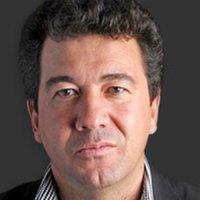Coronavirus: New York becomes Ground Zero again
- Published

The headlines seemed to be crowding in on us. The coronavirus had reached American shores.
It had come to the outer suburbs of New York. There were cases in the Bronx, Brooklyn, Queens and Manhattan.
By now, the news was coming word of mouth. Someone had tested positive in our downtown office complex. A tenant in a neighbouring apartment building had been laid low. Our school was shutting. All the schools were shutting. The whole of New York was soon in lockdown.
Back then I remember thinking how different this was to stories of the past. Whether it was war or disaster, there was always a plane to take you away to safety; always a refuge at the end of a harrowing ordeal. With Covid-19, however, there was no plane; there was no refuge. In this planetary pandemic, the entire world was a trouble-spot.
Also this was the first time my family was living the same story of disaster that I had to cover. They were subject to the same risks and dangers. They felt the same tensions and concerns. And for us there was an extra layer of anxiety. My wife, Fleur, is seven months pregnant.
So some of those headlines now came like thunderbolts.
A top New York hospital was barring partners from being present at the birth. Other maternity wards were following suit. Delivery rooms were being placed in Covid isolation: women sequestered from their partners, partners sequestered from their newborns.
New life in the time of coronavirus. The magical realism of birth was becoming something altogether more dystopian.
In pre-pandemic times - how quickly we've adopted the language of the before and the after - many New Yorkers suffered from a paranoia known as FOMO. The fear of missing out. Those who can afford it want to dine in the most fashionable new restaurants. Go see the hottest new Broadway show. Attend the latest gallery opening.
But the virus was something that everyone wanted to miss out on - the talk of the town that nobody wanted to speak of from firsthand experience.

Usually it's a battle to cross Times Square. Not any more
As the skies emptied of planes and we got used to seeing avenues without yellow cabs, the sound of the city changed. First we could hear the birds. Then they were drowned out by the sirens. Morning, noon and night. A ceaseless din. An unnerving din.
The city that never sleeps became the city that couldn't sleep. And the fear was the ambulance outside your window would become an ambulance outside your door. To a city known for its bravado and life abundant, the coronavirus brought an overriding sense of fear.
Just as people became scared of paramedics, people became frightened of hospitals - especially those with the white refrigerated trailers ranked outside, the city's mobile morgues that we hadn't seen on the streets since the days after 9/11.
Then, in this home of New World modernity, we witnessed something that seemed grotesquely medieval. The bodies of the unclaimed, those who had no next of kin, placed in plain wooden boxes, ferried across to an island near the Bronx and buried in a mass grave.
There was something inevitable about the world's most global city becoming the epicentre of a worldwide contagion. But few expected death on such an immense scale.
Once again, this city has become Ground Zero: that haunting phrase from the attacks of 11 September that New Yorkers hoped would never be applied here again. That was surely the city's most awful day. This surely has been its most awful season.
Drone footage shows mass burials in New York.
My first symptoms came on a Friday night, a weariness I put down to weeks of covering the outbreak, and the new parental juggle of helping to home school our kids. Then came the muscle pain, the cough, the numbing of my taste buds. Much more worryingly, Fleur was developing a fever. Then she had the cough, what felt like a weather system on her lungs, the chronic fatigue and the tell-tale shortness of breath.
New York attracts optimists. We both believed we'd be among those who only experienced mild symptoms. But Fleur's condition was deteriorating. Those sirens outside sounded even more threatening than before.
The symptoms got worse in the evening. With the coronavirus, darkness brought more menace. And late one night, when Fleur was struggling to breathe properly, we feared we would have to reach for the phone to call that much-feared number, 911.
Fewer things are more frightening than watching a loved one struggle to finish a sentence for lack of breath, and especially when that sentence is a matter of life and death.
Sleep usually brought some comfort, and did so again. Thankfully Fleur rallied. Her breathing improved. We could see that her blood oxygen levels were okay. She avoided hospitalisation.
Slowly, over the next few days, the clouds began to part. And eventually came the brilliant sunshine of full recovery. We could be counted amongst the fortunate, and we became even more mindful of the dead, and the loved ones they left behind.
Even in the midst of so much mourning, there have been uplifting New York moments.
The coronavirus has not crushed the charismatic personality of this city. We've seen firefighters pulling up outside hospitals then standing to applaud the nurses and doctors - the heroes of 9/11 saluting the new superheroes of Covid-19.

There's been the cheering and pot-banging every evening at seven, reverberating off the glass cliff-faces of Manhattan's skyscrapers and echoing through the outer boroughs. There have even been communal sing-alongs. One night it was Bill Withers Lean on Me. On another it was Frank Sinatra's rousing Big Apple anthem, New York, New York.
But for those who have suffered not just from the virus, but the economic contagion that has ravaged this city, the famous line from that song - If I can make it there, I'll make it anywhere - must now sound like a taunt.
How can you make it when your workplace is shutdown? How can you make it when there are no tables to clear or plates to scrub? When your shop is boarded up with plywood, as if a hurricane is about to rip through - which, economically, it has. Every single shutdown day.
In this hub of immigrant ambition and American abundance, we have witnessed scenes that look like they belong more in the days of the Great Depression. One of the neighbourhoods worst affected is a place called Corona in Queens. And there we have seen queues outside a food bank that stretched more than 200 yards, the length of the line a measure of the desperation.

More stories from New York
Nick Bryant meets New York City's newly unemployed

Cleaners, restaurant workers, labourers. The economic victims of Covid-19. People who only six weeks ago had full-time jobs, now forced to rely on welfare to feed their families. Here they lined up for hours for the most meagre of provisions. A sandwich, some sweet corn, a small carton of milk, a pot of apple sauce, in this the land of plenty.
In low-income immigrant communities, American dreams are being crushed by this global scourge.
Many rich New Yorkers, the city's one per cent, have simply left town, and headed for their country getaways in the Hudson Valley or coastal retreats in the Hamptons. That is not an option for the poor, many of whom live in multi-generational family dwellings, sometimes in one-bedroom apartments shared by 10 people.
So the coronavirus has been a tale of two cities, with Hispanics and African Americans being killed at twice the rate of white New Yorkers. Poverty has been a propagator of the pandemic. Hardship has been a super-spreader.
We're living through another time of "Buddy can you spare me a dime". Let's hope it doesn't become an era.
When Covid hit, the United States was also among the vulnerable, and the virus has exposed so many of its long-term ailments - its income disparities, racial inequality, democratic sickliness, inoperative government, toxic polarisation, decline of reason, the downgrading of science, the lessening of its global influence, the absence of its global leadership.


A SIMPLE GUIDE: What are the symptoms?
LIKE 9/11 EACH DAY: A New York paramedic's diary
FACTORY HOTSPOT: The untold story behind America's biggest outbreak
GUNS & CHEESE: The unexpected items deemed 'essential'
HOW YOU CAN HELP: Write a diary, donate blood, read books to kids

All have intersected and metastasized in this fatal moment. For a lifelong lover of America, it has been tragic to witness.
I live in one of the most impatient cities on the planet. They talk here of the New York minute. It means right away, immediately, without hesitation. But while parts of the Empire State will be able to start the gradual process of reopening in mid-May, the urban density of New York City means it will have to go at an uncharacteristically slower pace.
Every night at nine o'clock, the Empire State Building is illuminated in a red and white siren light to honour the emergency workers providing care. It's a ritual, at once staggeringly beautiful and ominously sinister, that will continue until this crisis is over.
But that's the unanswerable question - when will New York return to being New York.
